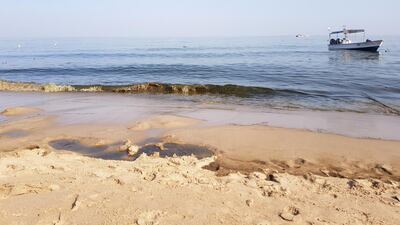The oil spill that hit the Fujairah coast on January 26 was the result of tankers illegally cleaning out their holds.
That is according to the general manager of Fujairah port, Capt Mousa Murad, who has called for 24-hour monitoring of ships to tackle the issue.
"The recent spills have been caused by tank cleaning by passing ships," Capt Murad told The National on Tuesday.
“Especially when tankers change from [carrying] one product to another," he said, implying that the spills are made up of residue cleaned from within the tanks.
He said the oil "comes from international waters and could hit Dibba, Fujairah or Khor Fakkan."
Capt Murad said the port is working with the Ministry of Climate Change and Environment and the UAE Armed Forces to address the problem.
Apart from individual states, the Arabian Gulf is monitored by the Marine Emergency Mutual Aid Centre and the Regional Organisation for the Protection of the Marine Environment.
But Capt Murad said it requires even more surveillance. “It requires 24-hour monitoring. This is what happens in Europe and Scandinavia and Japan so you can take an action immediately when someone is polluting the water.”
The issue is now in the spotlight again following the Al Aqah spill in January, which affected tourism and damaged marine life. Last year, the east coast of the UAE was hit by several oil slicks.
The UAE's territory extends to 12 nautical miles in water. Under the UAE's Federal Law No 24, all marine means of transportation are prohibited from discharging or disposing of oil or oil mixture into the marine environment. Penalties include imprisonment and fines of up to Dh1 million. But most of these incidents happen in international waters where it becomes more difficult to police.
“The UAE has enacted laws banning the throwing of waste and oil sludge into the water by the hundreds of tankers operating in the region,” said Salah Al Rayssi, director of the fisheries sustainability department at the Ministry of Climate Change and Environment.
“The Ministry of Climate Change and Environment works closely with local authorities to respond in real-time to oil spill incidents by overseeing the clean-up of contaminated beaches along the east coast of the UAE and finding the perpetrators, holding them accountable for their actions.”
Mr Al Rayssi said the ministry is working to enhance an oil-spill monitoring and detection system.
TankerTrackers.com, a pro-bono website that monitors the flow of oil at sea and investigates oil spills, previously suggested that January’s spill was caused by a ship-to-ship transfer.
Ship-to-ship transfers happen when a smaller vessel supplies a larger one with oil and spills from overflow can happen through negligence or by accident.
The UAE has been tackling the issue for years. Fujairah Port in 2005 prohibited ship-to-ship transfers in the port area. In 2007, the UAE signed up to the International Maritime Organisation's convention for the prevention of pollution from ships. Also known as the Marpol convention, it sets limits for discharge from oil tankers, including in the "special area" of the Arabian Gulf into the Sea of Oman.
However, Capt Murad said that "ship-to-ship transfers are an old issue. We now have a problem with the passing ships," he said.
Some ships have also been fined for illegally dumping into the water — the oil tanker Georgios was fined last year for discharging oil and chemical waste into the Sea of Oman.
_______________
Read more:
How the UAE is at the centre of efforts to tackle pollution at sea
Oil transfer at sea may have caused Fujairah spill


